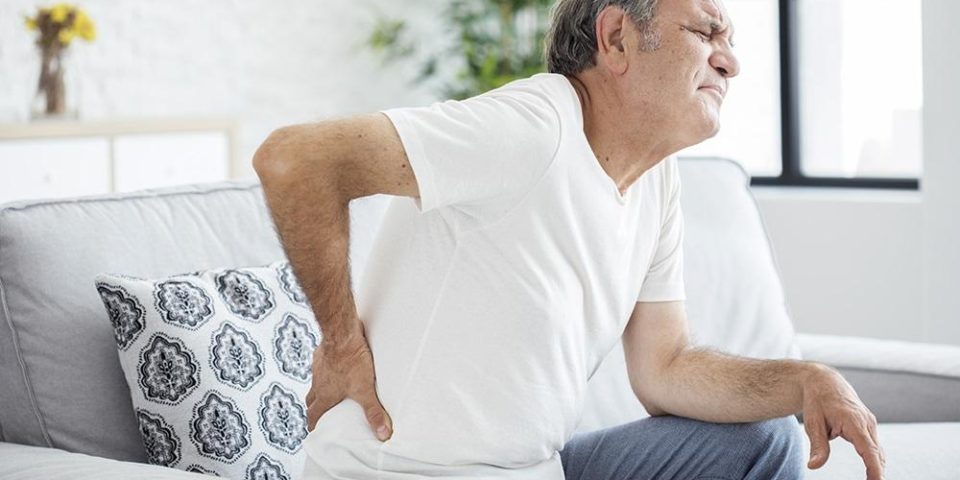Is that pain your back or your hip?
Back problems can frequently seem like hip problems, making it difficult to pinpoint the source of your pain. Stephen Finley, MD, explained how to differentiate between back pain and hip pain, what you can do to manage the pain at home, and when you should see a doctor.
When to suspect your back is the problem?
Most back problems that lead to confusion with the hip are from herniated disks that press on nerves in the spinal column. This produces referred pain or “sciatica” which can be felt in the hip region. Suspect the back if pain:
- Is limited to your back, buttocks or lateral hip.
- Shoots down your leg or is associated with a pins and needles sensations in the leg.
- Worsens with sitting or improves with standing or walking at times.
How do you treat or prevent back pain at home?
- Stay active with low-impact exercise. Prolonged bed rest can worsen things.
- Try a home exercise program focused on core conditioning.
- Strive for ergonomic positioning and posturing.
- Use over-the-counter medicine like ibuprofen or naproxen sodium.
- Lose weight and avoid smoking.
- Use ice packs or heat to loosen the muscles up prior to stretching routine.
When should you see a doctor for back pain?
- If pain persists despite self-care treatments and/or physical therapy.
- If the source of symptoms is difficult to pinpoint.
- If pain is constant or intense, especially at night or when you lie down.
- If pain spreads down one or both legs, especially if pain extends below the knee.
- If pain is associated with weakness, numbness or tingling in one or both legs.
- If pain occurs with unintended weight loss.
- If pain occurs with swelling or redness on your back.
- Seek immediate help if pain occurs after a high impact car crash, bad fall or sports injury.
- Seek immediate help if back pain is associated with inability to move the legs, bowel/bladder incontinence or severe pain with a fever.
When to suspect your hip is the problem
If you have groin pain, it’s likely your problem is the hip joint. The hip joint is closer to the front of the body than to the back of the body. The most common cause of hip pain in patients older than 50 is osteoarthritis of the hip.
In addition to groin pain, some common symptoms of hip osteoarthritis are:
- Discomfort that comes and goes but worsens with time.
- Worsening stiffness, particularly after holding still for some time, possibly causing difficulty with putting on shoes or socks.
- Pain made worse with activity and relieved with rest.
- One leg may feel shorter than the other and in more severe settings, the foot may rotate outward due to contracture at the hip.
How to treat hip pain at home?
Dr. Finley suggested the following at-home treatments for hip osteoarthritis:
- Maintain an active lifestyle consisting of low impact exercise like walking, elliptical, swimming, water aerobics or bicycling.
- Modify your activities to tolerate symptoms better such as avoiding repeated bending at the hip and avoiding direct pressure on the hip.
- Take pain relievers such as ibuprofen or naproxen sodium.
- Use a cane or walker to offload the hip.
- Maintain a healthy weight. Shedding excess pounds is critical in relieving hip pain and at times can increase your chance of a successful outcome if surgery is needed.
- Apply ice or heat. Use ice or a bag of frozen vegetables wrapped in a towel for pain relief or conversely a warm bath or shower may help prepare your muscles for stretching exercises that can reduce pain.
How do you prevent hip pain?
There are many causes of hip arthritis, but there are certainly some risk factors that can be modified:
- Avoiding trauma like an injury from a car wreck or fall.
- Maintaining a healthy weight.
- Avoiding heavy physical stress.
- Avoiding high impact sporting activities.
Some risk factors cannot be modified such as gender, increased age, genetics and some developmental or acquired deformities such as hip dysplasia.
When should you see a doctor for hip pain?
- If self-care treatments do not help or pain persists.
- If the source of your pain is difficult to pinpoint.
- If your hip pain was preceded by a traumatic fall or injury and you are unable to bear weight, unable to move a leg or have intense pain with attempts at moving the hip (particularly if associated with fever).
Find an orthopedic specialist you trust
Find a provider who’s right for you by viewing their online profiles, star ratings and reviews.
Find an Orthopedic Doctor

